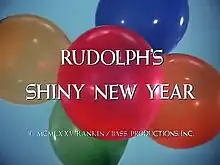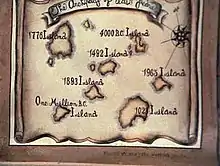| Rudolph's Shiny New Year | |
|---|---|
 Title card | |
| Written by | Romeo Muller |
| Directed by | |
| Voices of | |
| Narrated by | Red Skelton |
| Theme music composer | Johnny Marks |
| Composers |
|
| Country of origin |
|
| Original languages |
|
| Production | |
| Producers | |
| Cinematography |
|
| Running time | 50 minutes |
| Production company | Rankin/Bass Productions |
| Original release | |
| Network | |
| Release |
|
| Related | |
Rudolph's Shiny New Year is a 1976 American Christmas and New Year's stop motion animated television special and a standalone sequel to the 1964 special Rudolph the Red-Nosed Reindeer produced by Rankin/Bass Productions. The special premiered on ABC on December 10, 1976.[1]
Plot
Just after the events of Rudolph the Red-Nosed Reindeer, Santa Claus receives a letter from his friend Father Time asking for help to find Happy the Baby New Year before midnight ("the 12th bong") on New Year's Eve or else it will be December 31st forever. Santa sends Rudolph out to find him due to the snowstorm currently happening outside.
An evil giant vulture named Eon the Terrible is supposed to live for exactly one eon after which he will turn into ice and snow and disintegrate. As this particular eon will end January 1 of the New Year, he plans to kidnap Happy to keep the year from ending and stop time, thus preventing his predestined death.
General Ticker (a military clock) and the great Quarter-Past-Five, or Quart for short (a camel with a clock in his hump), bring Rudolph to Father Time's castle beyond the Sands of Time. Father Time speculates that Happy, who ran away due to his big ears being laughed at when they were first seen by Nanny Nine O'Clock, is hiding out in the "Archipelago of Last Years" where the Old Years retire and rule over an island styled to resemble the year over which they ruled. When Rudolph is attacked by Eon on the ocean while en route to the Archipelago, he is saved by Big Ben (a sperm whale with a clock attached to his tail) who transports Rudolph across the ocean.
Upon arrival in the Archipelago, Rudolph first travels to the island belonging to a caveman named O.M. (short for One Million B.C.). O.M. inhabits an island anachronistically inhabited with friendly dinosaurs and other prehistoric creatures. As Rudolph and his friends search for Happy (who left after his hat accidentally fell off saving a baby Pterodactyl and revealing his big ears, causing the dinosaurs to laugh), they repeatedly encounter Eon.
After other off-screen visits to the islands of 4000 B.C., 1492, 1893, and 1965 have been completed without success, Rudolph and O.M. head for the island of 1023 (pronounced "ten to three," as in the time 2:50), belonging to a Scottish knight with a long beard named Sir 1023 whose island is filled with medieval trappings along with several fairy tale and Mother Goose characters. Meanwhile, Happy manages to befriend the Three Bears, but becomes saddened when he is forced to remove his hat while playing a game with Baby Bear and exposes his big ears to them, causing him to leave again despite Baby Bear begging him not to go.
The group then travels to the island of 1776, which reflects Colonial America and is ruled over by "Sev" (AKA 1776) who resembles Benjamin Franklin. Following Happy's seeming rejection on the Island of 1776 following the daily Fourth of July parade, Eon kidnaps him and takes him to his lair on the Island of No-Name which is said to be located "due north of the North Pole".
The group now leaves the Archipelego in pursuit. Catching up to Eon, they attempt to rescue Happy. However, Eon (upon being awakened by the sound of O.M. tumbling) thwarts them by sending an avalanche down on the group and trapping them inside giant snowballs. Managing to melt his way free using his nose, Rudolph climbs up to Eon's nest where he finds Happy, who refuses to leave. Rudolph shows Happy his nose and tells him his own story of being bullied because of his nonconformity before asking Happy to let him see his ears. Happy does so, and Rudolph, like everyone else before him, laughs at the sight. Happy once again gets upset, but Rudolph explains that the sight of Happy's ears had made him feel so wonderful that he had to laugh out loud, just like it had done with everyone else. With this declaration, Happy shouts out with joy, but causes Eon to awaken. Rudolph quickly tells Happy to take off his hat and leave it off for good. At the sight of Happy's large ears, Eon bursts into uncontrollable laughter which sends him tumbling down the side of the mountain and into the three remaining snowballs, freeing O.M., 1023, and Sev. Rudolph realizes that Eon is now so full of warmth and happiness that it would be impossible for him to turn to ice and snow.
Santa arrives and the gang returns to Father Time's castle with Happy just before the 12th bong, which is designated "19-Wonderful".
Archipelago of Last Years

When the old year has been retired, they settle on an island in the Archipelago of Last Years where time remains still on that island. Among the islands of the Archipelago of Last Years are:
- 1,000,000 B.C. Island: Represented as a prehistoric, anachronistic island that consists of friendly dinosaurs, other prehistoric creatures, and cavepeople living together. One Million, also known as "O.M.", lives here.
- 4,000 B.C. Island: Rudolph mentions that its inhabitants wanted to only build pyramids. (This would be, in real life, approximately one millennium before the first Nile River valley pyramid, Adjib's Tomb, was built.)
- 1023 Island: Represented as a medieval island inhabited by fairy tale characters. Father Time states that the year of 1023 was when all the well-known fairy tales and nursery rhymes actually happened. Sir 1023, also known as "Ten-to-Three", lives here.
- 1492 Island: Rudolph mentions that the people on that island were "too busy discovering things." to talk to Rudolph and O.M. The first voyage of Christopher Columbus took place that year.
- 1776 Island: Represented as a Colonial American island that celebrates American Independence Day on a daily basis. 1776, also known as "Sev", lives here.
- 1893 Island: Rudolph mentions that the inhabitants have never heard of Happy. 1893 marked the beginning of a major economic depression in the Western Hemisphere, the Panic of 1893.
- 1965 Island: Rudolph stated that island was "too noisy" to search for Happy; "noisy" world events of 1965 included Beatlemania (and other British Invasion-related hysteria) as well as the growing opposition to United States involvement in the Vietnam War.
Cast

- Red Skelton as Father Time (Narrator), Baby Bear
- Billie Mae Richards as Rudolph
- Morey Amsterdam as One Million BC
- Frank Gorshin as Sir 1023
- Paul Frees as 1776, Santa Claus, General Ticker, Aeon the Terrible, Humpty Dumpty and The Great Quarter Past Five (AKA "Quart")
- Don Messick as Papa Bear, Rumpelstiltskin, Prince Charming, Seven Dwarfs
- Harold Peary as Big Ben the Whale
- Iris Rainer as Mama Bear, Nanny Nine O'Clock, Happy the Baby New Year
Songs
- "The Moving Finger Writes"
- "Turn Back The Years"
- "It's Raining Sunshine"
- "What A Wonderful World We Live In"
- "Fourth of July Parade"
- "Have A Little Faith In Me"
- "Rudolph the Red-Nosed Reindeer"
- "Have a Happy New Year"
Production
The special was filmed in 1975 (according to the copyright), but it was shown on ABC on December 10, 1976.
For the special, Rudolph was given a redesign by Paul Coker, Jr.[2]
Television rights
The rights to this special are held by Warner Bros. Domestic Television Distribution, which used to license the show to The Walt Disney Company; Disney carried the special Freeform annually on its 25 Days of Christmas marathon (and occasionally aired it over-the-air on ABC). Since 2018, Warner Bros. has licensed the special to AMC and its sister channels for the Best Christmas Ever block.[3]
Home media release
Rudolph's Shiny New Year was first released on VHS by Warner Home Video in 1992. It was also re-released on VHS in 1999, and for the first time on DVD alongside The Year Without a Santa Claus, on October 31, 2000. The special, along with other Rankin/Bass Christmas specials and Chuck Jones's animated TV adaptation of Dr. Seuss' How the Grinch Stole Christmas!, was bundled in Warner's Christmas Television Favorites DVD box set, released on October 2, 2007. On October 7, 2008, these same titles were released in another holiday-themed DVD set, Classic Christmas Favorites. Warner Home Video released seven different original Rankin/Bass holiday classics along with Dr. Seuss' How the Grinch Stole Christmas! on the third DVD box set, Santa's Magical Stories, released on October 4, 2011. A Miser Brothers' Christmas, a sequel to the 1974 special, The Year Without a Santa Claus, is also included.
See also
References
- ↑ Hyatt, Wesley (2004). A Critical History of Television's The Red Skelton Show, 1951–1971.
- ↑ Evans, Greg (July 29, 2022). "Paul Coker Jr. Dies: Designer Of Rankin/Bass Classic Holiday Characters & Longtime Mad Magazine Illustrator Was 93". Deadline. Retrieved July 29, 2022.
- ↑ Adalian, Josef. "AMC Nabs Christmas Classics As the War for Holiday TV Audiences Heats Up". Vulture. Retrieved November 17, 2018.